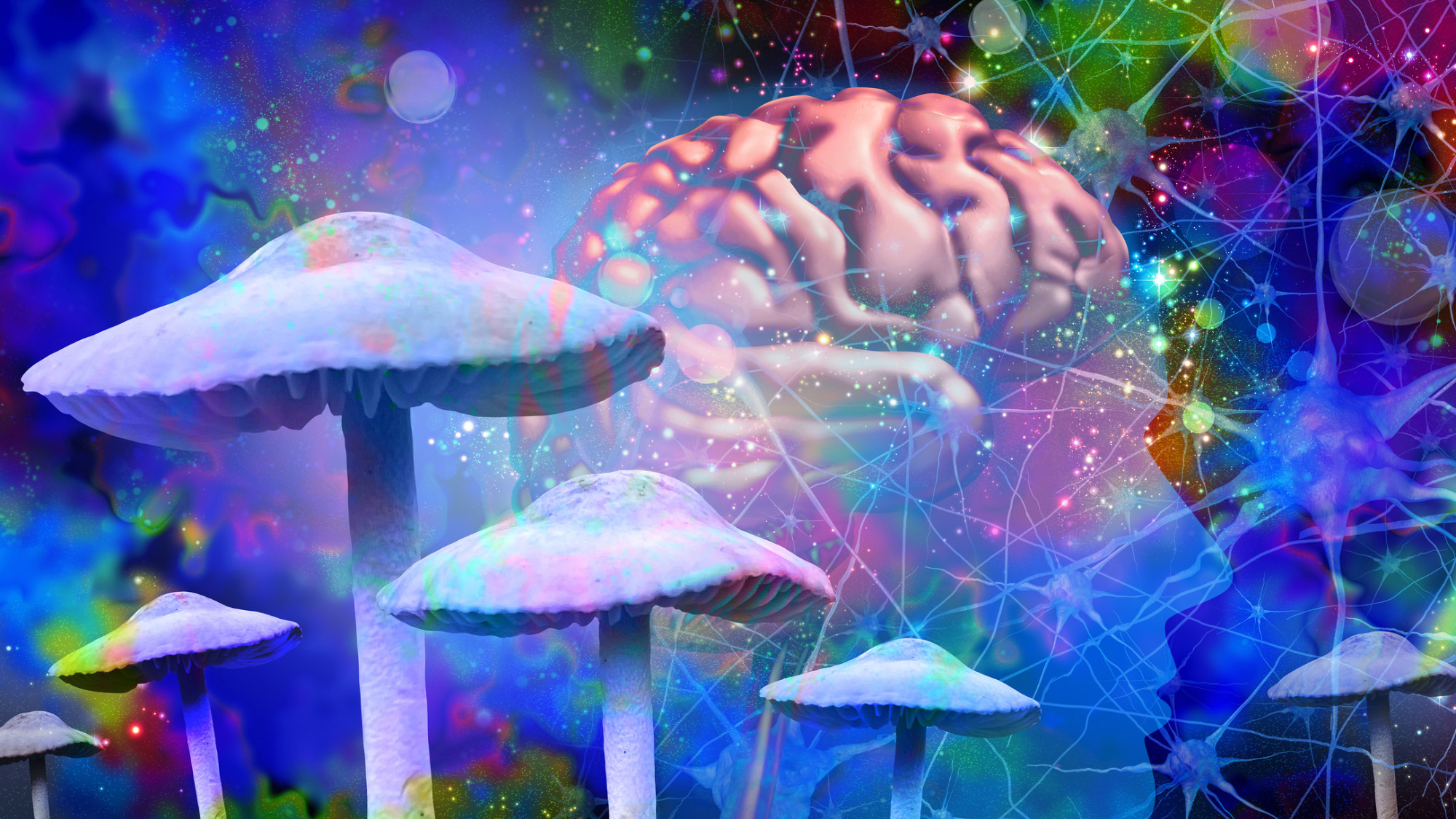Psychedelic drugs and treating mental illness
Scientists claim hallucinogens could help treat depression and anxiety, but not everyone is convinced

A free daily email with the biggest news stories of the day – and the best features from TheWeek.com
You are now subscribed
Your newsletter sign-up was successful
Psychedelics are often associated with the counterculture of the 1960s, embraced by hippies as a way to "turn on, tune in, drop out". Today, however, researchers believe that, used carefully, mind-altering drugs could help treat poor mental health.
Clinical trials of psychedelic-assisted therapies have been ongoing in the UK for several years, with centres such as King's College London and Imperial College London carrying out studies into their effectiveness. Meanwhile, in May, volunteers were being sought to take part in a Scottish phase of a worldwide clinical study into the use of psychedelics to treat depression.
Use of psychedelic drugs is tightly controlled in the UK, in contrast to the US, where a number of states have decriminalised or legalised some forms. In February, academics from the Parliamentary Office for Science and Technology published a briefing paper for MPs "evaluating evidence for the use of psychedelic-assisted therapy to treat mental health conditions" like anxiety and depression. A "major briefing" is to follow later in the year.
The Week
Escape your echo chamber. Get the facts behind the news, plus analysis from multiple perspectives.

Sign up for The Week's Free Newsletters
From our morning news briefing to a weekly Good News Newsletter, get the best of The Week delivered directly to your inbox.
From our morning news briefing to a weekly Good News Newsletter, get the best of The Week delivered directly to your inbox.
What are psychedelics?
There are a range of psychedelic drugs, among them MDMA, also known as ecstasy, and LSD, as well as "magic mushrooms", whose active ingredient is a hallucinogen called psilocybin. Some psychedelics are found in nature, while others are manufactured.
Ketamine is considered by some to be psychedelic, said Annie Lennon in Psychology Today, but it works on the mind in "profoundly different ways". Rather than bringing about "powerful and sometimes challenging experiences" like psychedelics, it has a gentler effect on the brain that appears to "free people from their anchors to physical reality", Lennon said. For this reason, The Guardian described it as a "dissociative hallucinogen".
What effect do they have on the mind?
Psychedelics create an "altered state of consciousness" that not only affects each of the senses, but can "shift a person’s thought processes, sense of time and emotions", researcher Dr Claudia Schwarz-Plaschg told the European Commission's Horizon magazine.
An Imperial College study looked into the psychedelic DMT, which is found in ayahuasca, "the psychedelic brew prepared from vines and leaves and used in ceremonies in south and central America". It found that different regions of the brain became more active and connected in volunteers taking the drug. This led to them having "vivid and bizarre visions", such as visiting alternative realities or dimensions.
A free daily email with the biggest news stories of the day – and the best features from TheWeek.com
Can psychedelics ease mental health problems?
While trials are ongoing for several psychedelics that could be used to treat mental health problems, February's parliamentary briefing said psilocybin was the drug for which there was "most evidence for its effectiveness".
Professor Jo Neill at the University of Manchester said psilocybin could be a "paradigm shift in mental health treatment", said The Herald, and had shown long-term impact on depression and anxiety. "Psychedelics are what we should have been looking at for all this time. The shamans have known about their healing properties for such a long time," she said.
Psilocybin's benefits could extend beyond those struggling with serious mental health conditions. A growing number of people have embraced microdosing psilocybin – taking tiny doses well below the threshold to trigger a "trip" – as a way to alleviate the stresses of everyday life. One woman, referred to as "Ella", told Sky News that microdosing made her feel calmer, happier and a "better parent".
Neuropsychologist and author Andy Mitchell, who tried several psychedelic substances for a new book on the subject, warned that their clinical efficiency has been "massively over-hyped", telling The Times it is too early to assess their long-term effects. While psychedelics "clearly offer some hope" for mental health treatments in the future, we cannot view them as a "panacea" that will be able to "relieve us all from suffering".
What is the NHS position?
Several NHS organisations have given their support to the ongoing clinical trials, including NHS Research Scotland, while the Maudsley Hospital in south London last year opened its Centre for Mental Health Research and Innovation to "accelerate research into psychedelics and develop new models of care for mental health".
Most psychedelic drugs are illegal in the UK and their use is tightly controlled. Professor David Nutt of Imperial College London told The Guardian in 2022 that scientists were able to study ketamine because "it's a legal drug so we can prescribe it off-licence". But when it came to researching into other psychedelics, "patients are being denied access because of the regulations". "The research is really hampered by the legal status," he said.
Will that change?
Several leading scientists have called on the UK to end what The Guardian described as its "draconian licensing laws" and properly fund research into psychedelics. However, Dr Grace Blest-Hopely, a neuroscientist and psychedelic researcher affiliated with King's College London, told the BBC the issue had been "swiftly done away with" whenever it had been brought to parliament and there were "no plans" to review the situation.
Despite this, businesses believe psychedelics will have a future in treating mental health problems. According to the Financial Times, "hundreds of millions of dollars" are being poured into biotechnology companies in the expectation that treatments could be authorised around the world.
"Psychedelics have already arrived in society as an accepted fact," said German financier Christian Angermayer, who has helped fund research into how psychedelics could treat mental health conditions. "The demand is so high and the current treatments are so bad."
Elizabeth Carr-Ellis is a freelance journalist and was previously the UK website's Production Editor. She has also held senior roles at The Scotsman, Sunday Herald and Hello!. As well as her writing, she is the creator and co-founder of the Pausitivity #KnowYourMenopause campaign and has appeared on national and international media discussing women's healthcare.
-
 Bonfire of the Murdochs: an ‘utterly gripping’ book
Bonfire of the Murdochs: an ‘utterly gripping’ bookThe Week Recommends Gabriel Sherman examines Rupert Murdoch’s ‘war of succession’ over his media empire
-
 Gwen John: Strange Beauties – a ‘superb’ retrospective
Gwen John: Strange Beauties – a ‘superb’ retrospectiveThe Week Recommends ‘Daunting’ show at the National Museum Cardiff plunges viewers into the Welsh artist’s ‘spiritual, austere existence’
-
 Should the EU and UK join Trump’s board of peace?
Should the EU and UK join Trump’s board of peace?Today's Big Question After rushing to praise the initiative European leaders are now alarmed
-
 ‘Zero trimester’ influencers believe a healthy pregnancy is a choice
‘Zero trimester’ influencers believe a healthy pregnancy is a choiceThe Explainer Is prepping during the preconception period the answer for hopeful couples?
-
 ‘Longevity fixation syndrome’: the allure of eternal youth
‘Longevity fixation syndrome’: the allure of eternal youthIn The Spotlight Obsession with beating biological clock identified as damaging new addiction
-
 Stopping GLP-1s raises complicated questions for pregnancy
Stopping GLP-1s raises complicated questions for pregnancyThe Explainer Stopping the medication could be risky during pregnancy, but there is more to the story to be uncovered
-
 RFK Jr. sets his sights on linking antidepressants to mass violence
RFK Jr. sets his sights on linking antidepressants to mass violenceThe Explainer The health secretary’s crusade to Make America Healthy Again has vital mental health medications on the agenda
-
 Nitazene is quietly increasing opioid deaths
Nitazene is quietly increasing opioid deathsThe explainer The drug is usually consumed accidentally
-
 The plant-based portfolio diet invests in your heart’s health
The plant-based portfolio diet invests in your heart’s healthThe Explainer Its guidelines are flexible and vegan-friendly
-
 More women are using more testosterone despite limited research
More women are using more testosterone despite limited researchThe explainer There is no FDA-approved testosterone product for women
-
 Doctors sound the alarm about insurance company ‘downcoding’
Doctors sound the alarm about insurance company ‘downcoding’The Explainer ‘It’s blatantly disrespectful,’ one doctor said